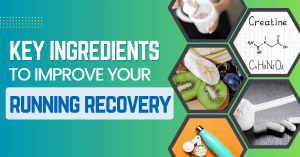Throughout my early running career I suffered from major stomach issues when training and racing hard. Whenever I tried to really push myself, my stomach seemed to cramp up and I would have gas and digestive issues for hours after races and hard workouts.
I constantly experimented with the foods I ate before running and throughout the day and tried antacids and other stomach medications.
Nothing seemed to do the trick.
Then a few years ago I stumbled upon some research about digestive enzymes when investigating the role of protein in marathon fueling. This initial glimpse of the research prompted me to start diving in deep about the role of digestive enzymes, especially as they relate to running performance.
So, in this article I’ll present the research I found about the role digestive enzymes may play in helping runners who:
- Have sensitive stomachs and suffer from cramps and digestive issues during or after hard runs.
- Those who find it difficult to consume sufficient protein.
- Suffer from food sensitivities or allergies.
- Often find themselves deficient in vitamins and minerals, despite eating a healthy diet.
What Digestive Enzymes Do
So, what exactly are digestive enzymes and how do they work?
Digestive enzymes are naturally occurring proteins that your body makes to break down food and aid digestion.
There are many digestive enzymes produced throughout your stomach and small intestine, but your pancreas is really considered the powerhouse of digestive enzyme production.
Here’s a quick overview of some of the more important digestive enzymes and how they work to help you digest specific foods and food groups.
Alpha-Galactosidase
This is the enzyme that helps to break down legume starch, like from beans. Sufficient levels of alpha-galactosidase will help breakdown these starches more efficiently and prevent the formation of gas in the body. This can be especially helpful if you notice you’re always very gassy after eating beans.
Amylase
This is the main enzyme used to breakdown the starches from carbohydrates. As you well know, carbohydrates are our most efficient source of fuel, so being able to break these down quickly and fully is critical for runners.
Protease
Protease is likely the most important for runners and athletes as it’s the digestive enzyme responsible for the breakdown of protein rich foods. It’s a critical enzyme for runners since we’re notorious for not consuming enough protein to support the amount of training stress we incur each day. Many runners struggle to eat sufficient protein in part because it can be difficult to digest. You may even notice that you suffer from gas when you consume high amounts of protein. Having sufficient levels of protease can definitely help in this situation.
Lactase
Lactase is necessary for the breakdown of any sugars found in dairy products including milk, yogurt and cheese. If you’re sensitive to lactose, this likely means that you don’t possess enough of the digestive enzyme lactase to deal with all the lactose you are consuming. As a result, you get issues such as gas, bloating, and digestive distress after eating dairy rich foods.
Cellulase
Cellulase is the enzyme that is used to break down and digest cellulose, which is found in dietary fiber rich foods. This includes the fruits, vegetables, as well as the grains and seeds that you are consuming. Having sufficient cellulase will help ensure you breakdown and absorb the nutrients from the fruits and vegetables you’re eating.
Xylanase
This digestive enzyme is one that can help with the breakdown of plant fibers, so it is an especially important digestive enzyme for anyone who is a vegetarian, or who simply consumes a lot of fresh fruits and vegetables.
Peptidase
This is a digestive enzyme that is responsible for helping with the breakdown of casein in milk and protein powder as well as can help with the breakdown of gluten.
This is by no means a comprehensive list of all the enzymes your body produces. However, I wanted to highlight some of the more important ones so that you can see how they work in conjunction to help you digest foods.
Moreover, hopefully you’ve started to see how not producing sufficient levels of these digestive enzymes can impact how efficiently you’re absorbing the nutrients you eat as well as potentially contributing to stomach issues you may have during or after running.
How Can Enzymes Improve Overall Health and Performance
Now that you understand exactly what digestive enzymes are and how they work, let’s take a deeper look into how having proper enzyme levels can actually improve overall health and running performance.
Help Digest Foods, Especially Proteins
As you can gather just by understanding the function of digestive enzymes, they are critical to properly digesting the food you eat.
For example, let’s say that you eat an 8oz piece of steak for dinner. The digestion process starts with your saliva, but than quickly moves to the small intestine and pancreas.
Here, the digestive enzyme protease goes to work, quickly breaking down that protein so it can be used by the body. Without the protease enzymes, the breakdown process slows to a crawl and you end up with stomach issues.
Here’s a cool time lapse video that demonstrates the difference a protease enzyme can make when digesting a piece of steak.
Help Absorb More of the Nutrients From Food
Likewise, when you’re able to properly breakdown the food you eat, you’re able to absorb more of the nutrient content of that food.
When food isn’t properly digested, it’s sent out of the body, which means you can’t absorb the nutrients within that food. So, you can eat all the healthy fruits and vegetables you want, but if you don’t properly digest them, then you won’t be absorbing the critical vitamins and minerals.
In fact, a 2007 in vitro study showed that supplementing with digestive enzymes significantly enhances the absorption of many important nutrients — up to 66% more in certain cases
This increased absorption included key amino acids such as arginine, citrulline, and tryptophan, as well as vitamins such as folate.
Increase Energy
The less optimal your digestion, the more energy your body requires to properly digest food, which may leave you experiencing a slump in energy after meals.
Also, suboptimal digestion allows incompletely digested foods to trigger your immune system, leading to inflammation that can rob you of your energy.
Lastly, nutrient deficiencies such as low iron and vitamin B12, already common amongst runners, can often lead to perpetual fatigue. This can be exacerbated when you’re not properly absorbing these already difficult to absorb nutrients.
Improve Recovery
Exercise scientists have published some remarkable research about proteolytic enzymes in the past decade.
Most notably, a study by Beck et al in 2007 demonstrated a “statistically significant” difference in recovery time between subjects given proteolytic enzymes and subjects given a placebo.
The group given the proteolytic enzymes was able to produce greater overall force with their muscle, leading the experimenters to conclude recovery was quicker.
Improved Recovery was further bolstered by a 2017 study where researchers showed that enzyme therapy before and after exhaustive exercise improved strength gains and reduced lab markers of inflammation.
Do You Need to Supplement? If So, How to Take
If you suffer from a sensitive stomach during or after hard training like I did, then digestive enzymes might be a helpful solution for you as well.
In my case, they dramatically improved my stomach issues to the point that when I am consistent about taking my enzymes in the morning, I never even think about my stomach during or after runs.
They may also help if you have some slight food intolerances or sensitivities such as dairy products or gluten.
What Should a Good Digestive Supplement Contain?
Like with any supplement, you’ll want to make sure you’re taking something with the highest quality ingredients as well as a digestive enzyme blend made for athletes.
For example, you’ll want a supplement that contains all the different types of protease.
Remember, protease is the enzyme responsible for protein digestion, which is critical to recovery and performance, especially for runners who are notorious for low protein intake levels.
Protease is typically one of the more expensive enzymes to produce and to keep stable, so many cheaper enzyme supplements will be loaded with cheaper enzymes that may not be as important to athletes.
You’ll also want an enzyme mix that has an array of digestive enzymes (especially the ones I highlighted above) to ensure it hits any food sensitives you may have.
My Recommendation
My recommendation for digestive enzymes is MassZymes and it’s the supplement I personally use after conducting extensive research on enzyme effectiveness.
First, it has the full spectrum, with 17 digestive enzymes, so I know I am covering all my bases.
More importantly, it contains five types of protease, ensuring a superior dose and making sure it is effective at all pH levels.
It also contains AstraZyme, an all-natural plant-derived compound extracted from Panax ginseng and Astragalus that studies have shown can boost amino acid absorption by 30-60 percent. This is something I’ve only found in MassZymes.
They even have an offer to get a free bottle so you can try it with no risk. Here’s a link to get the free bottle.
How to Take
I take my enzymes each morning. Taking on an empty stomach helps absorption and makes it easy to add to my routine without extra hassle.
Often, I’ll take an extra dose if I am having a heavy protein meal or know I will be drinking a lot of protein shakes or eating protein bars during a busy day, just to be sure I am able to properly breakdown all the protein.
This has really cut down stomach issues I’ve had after long travel days.
Hopefully, this review of some of the science behind digestive enzymes helped you better understand how your digestive process works and gives you an option to solve any gas, bloating and stomach issues you may have during or after training.







